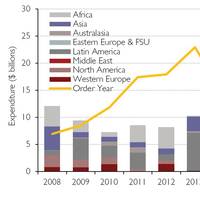Floating Production

Douglas-Westwood forecast that between 2013 and 2017, $91bn will be spent on floating production systems (FPS) – an increase of 100% over the preceding five-year period. A total of 121 floating production units are forecast to be installed – a 37% increase. This growth is driven by multiple factors, such as a larger proportion of newbuilds and conversions compared to redeployments, a greater degree of local content which often results in a higher cost base and general offshore industry cost inflation.
Floating Production Expenditure set to Double

Douglas-Westwood forecast that between 2013 and 2017, $91bn will be spent on floating production systems (FPS) – an increase of 100% over the preceding five-year period. A total of 121 floating production units are forecast to be installed – a 37% increase. This growth is driven by multiple factors, such as a larger proportion of newbuilds and conversions compared to redeployments, a greater degree of local content which often results in a higher cost base and general offshore industry cost inflation.
Floating Production Expenditure set to Double
Latin America to account for 29% of installations 2013-2017; FPSOs remain by far the largest segment of the market; Deepwater driving growth, with FPS supply affected by financing, leasing and local content. DW forecast that between 2013 and 2017 $91bn will be spent on floating production systems (FPS) – an increase of 100% over the preceding five-year period. In Douglas-Westwood’s new World Floating Production Market Forecast 2013-2017, a total of 121 floating production units are forecast - a 37% increase. This growth is driven by multiple factors, such as a larger proportion of newbuilds and conversions compared to redeployments, a greater degree of local content resulting in increased costs and general offshore industry cost inflation.





